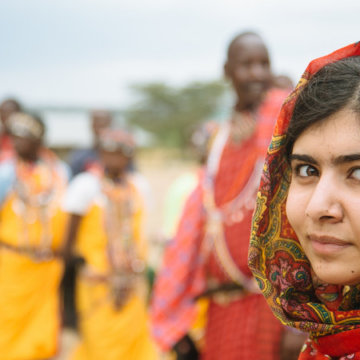- About
- Topics
- Story
- In-Depth
- Picks
- Opinion
- News
- Donate
- Signup for our newsletterOur Editors' Best Picks.Send
Read, Debate: Engage.
| located: | Pakistan, Afghanistan |
|---|---|
| editor: | Shadi Khan Saif |
Returning home after years of living away can be an exciting experience for anyone, except for Malala Yousafzai, the youngest Nobel laureate in history, who has returned to her home country of Pakistan for the first time after almost six years.
The global icon for girls’ education, Malala Yosufzai (named after the brave Afghan girl of Maiwand who mobilised her countrymen against the invading British army in the 19th century) touched down in her hometown Swat last week. Celebrated worldwide for her courage and dedication towards education in the wake of brutal Taliban militancy, the young woman was surrounded by a handful of government officials under army-controlled security during this landmark visit.
In an emotional address, Malala dubbed her homecoming as a dream-come-true moment. "Today is the happiest day of my life,” she expressed in her mother-tongue Pashto.
In October 2012, Malala — then 15 years old — was shot in the head at point-blank range by Taliban gunmen as she was returning from her school in Swat valley. She suffered bullet injuries and was admitted to the local military hospital, but was later flown to the U.K. for further treatment.
In spite of her rapid rise to fame, or perhaps due to her global reputation, a significant number of people in Pakistan, a country of some 200 million citizens, still see her as a foreign ‘stooge’, which mounts to prevailing Westophobia in the backdrop of the west's growing Islamophobia.
In Lahore, Pakistan’s second biggest city, ‘I am not Malala Day’ was celebrated to condemn the arrival of the Nobel laureate. The President of All Pakistan Private Schools Federation, Kashif Mirza, representing over 200,000 private schools embarked on this mission over Malala’s alleged anti-Pakistan and anti-Islam views. While the top leader of the group who has openly taken responsibility for the attack on Malala, Tehreek-e-Taliban Pakistan (TTP), remains in control of security forces. Ehsanullah Eshan, a former mouthpiece of the (TTP) has proudly claimed responsibility for a number of brazen militant attacks across the country for years, leaving scores of civilians, including women and children, dead and wounded.
In a recent New York Times op-ed on the matter, Mohammad Hanif, a leading Pakistani journalist was completely removed from the NYT’s edition published in Pakistan last year. Hanif had written that with Ehsan’s appearance, the Pakistani Army seemed to be sending this message: "You can kill thousands of Pakistanis, but if you later testify that you hate India as much as we do, everything will be forgiven."
Photo: Change.org
